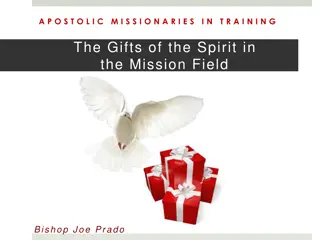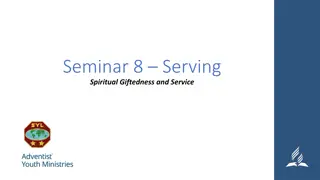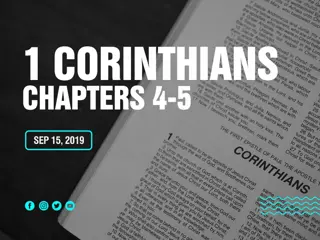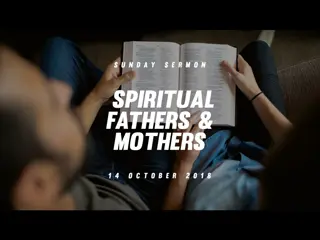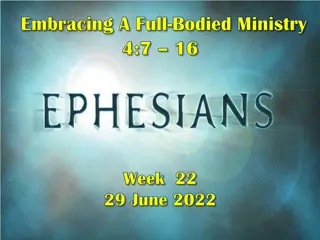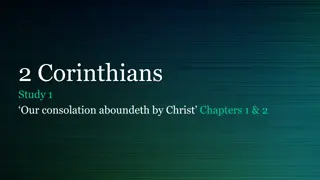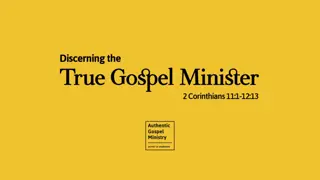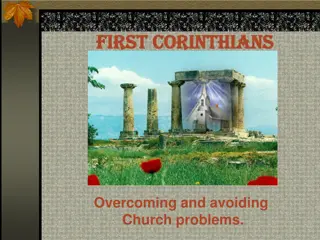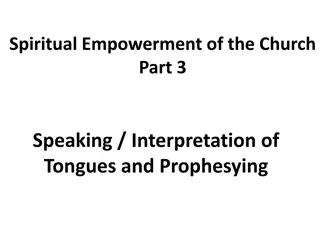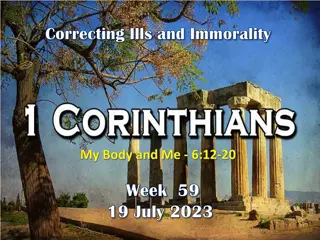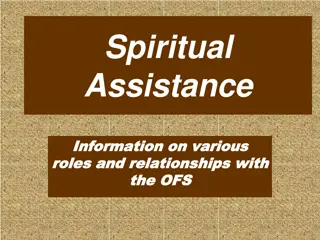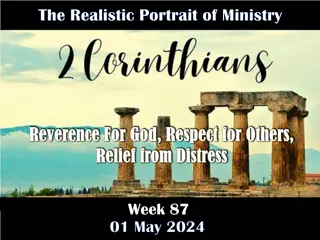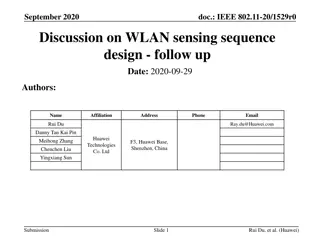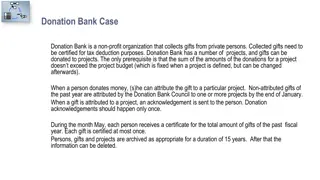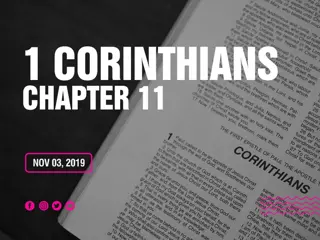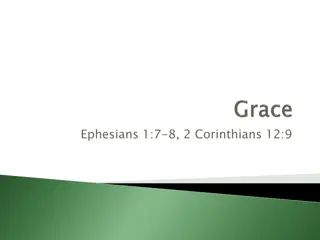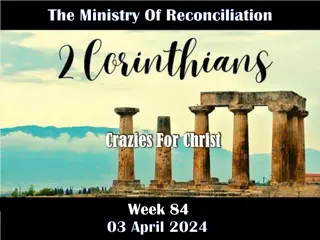Understanding Proper Function of Spiritual Gifts in 1 Corinthians
Continuing the study in First Corinthians, the focus is on addressing disorder and confusion during worship due to the misuse of spiritual gifts, especially speaking in tongues and prophecy. Paul emphasizes the importance of conducting worship services to edify the congregation and promote understanding. Using the analogy of the Blind Men and the Elephant, the lesson highlights the need to grasp the proper function of spiritual gifts in the context of the whole church body.
Download Presentation

Please find below an Image/Link to download the presentation.
The content on the website is provided AS IS for your information and personal use only. It may not be sold, licensed, or shared on other websites without obtaining consent from the author. Download presentation by click this link. If you encounter any issues during the download, it is possible that the publisher has removed the file from their server.
E N D
Presentation Transcript
Ordering Church and Worship Ordering Church and Worship An Answer to Charismatic Confusion Week Week 69 69 01 November 2023 01 November 2023
1 CORINTHIANS INTRODUCTION As we continue our study in First Corinthians, we want to remember that the theme of this letter revolves around Christian Conduct in the local church and how it influences unity,discipline,andspiritual growth Again, the primary issue in the church at Corinth was Progressive Sanctification the development of Holy character and the application of Christian principles and discipline on an individual and corporate level. So the corrective in this letter is behavior rather than doctrine. In this study, Paul addresses the problem of disorder, and confusion that was occurring during their worship services, due to the misuse of spiritual gifts, particularly the gift of speaking in tongues and prophecy. His focus here is on ensuring that the worship services are conducted in a way that promotes the edification and understanding of the entire congregation.
1 CORINTHIANS - LESSON OVERVIEW Swindoll begins our lesson with a snippet from Poet John Godfrey Saxe poem The Blind Men and the Elephant. A humorous retelling of an ancient Hindu folk tale. It was six men of Indostan To learning much inclined, Who went to see the Elephant (Though all of them were blind), That each by observation Might satisfy his mind. In the story, six blind men, having never heard of an elephant before, approach the massive elephant at different points, examine their small part of the beast, and then draw their conclusions about the animal based on their limited observation.
1 CORINTHIANS - LESSON OVERVIEW The first blind man falls against the animal s broad, sturdy side, concluding that the elephant is like a wall. The second blind man feeling the smooth, sharp tusk, determine that the elephant is like a spear. The third blind man grasping the squirming trunk, pictures an animal much like a snake. The fourth blind man feeling around a massive, rough skinned leg, deduces that the elephant actually resembles a tree. The fifth blind man examining the elephant s floppy ears, compares the animal to a waving fan. The sixth blind man, seizing the creature s swinging tail, concludes that the elephant is like a rope.
1 CORINTHIANS - LESSON OVERVIEW The poem concludes this comical portrayal of their failed investigations with these words: And so these men of Indostan Disputed loud and long, Each in his own opinion Exceeding stiff and strong, Though each was partly in the right, And all were in the wrong! As we prepare to wade through Paul s argument concerning the proper function of spiritual gifts especially the question of the gift of tongues we need to understand all its individual parts in light the whole. Remember, this is always true of our interpretation of scripture.
1 CORINTHIANS - LESSON OVERVIEW And it becomes especially vital when we tackle controversial issues disputed loud and long, by numerous voices, all holding their opinions exceeding stiff and strong. While some Commentators on scripture simply ignore this elephant in the room. Paul sorts through the Corinthians charismatic confusion, so we can address the issues he raised with honesty, objectivity, fairness, and balance. Sincerely seeking truth! While still asking questions like: How important is the gift of speaking in tongues? Should we strive to speak in tongues? Does the gift of tongues belong in our church? Is its really a spiritual gift, or simply an ecstatic emotional high?
1 CORINTHIANS - LESSON OVERVIEW In this 14th chapter, Paul provides several helpful principles and guidelines on the value and role of the gift of speaking in tongues in the first century church. Swindoll say the goal is to understand the parts in light of the whole, so we will review all forty verse in one broad sweep. This way we can avoid the common error of taking individual verses of scripture out of context and wrongly concluding that our elephant is actually a snake, a spear, or a rope. Then, to help us consider the whole picture, he offers two introductory remarks: First we are studying 1 Corinthians 14, not the book of tongues, so we need to let Paul s words put this issue into the proper perspective.
1 CORINTHIANS - LESSON OVERVIEW Second the main subject of 1 Corinthians 12 14, is spiritual gifts as a whole; it is not restricted to the single subject of speaking in tongues. Paul emphasizes the gift of speaking in tongue in chapter 14, not because of it special importance among the spiritual gifts, but because the Corinthians had taken it to improper extremes. Knowing that the Corinthians had been abusing this gift in particular, Paul spends time on this subject not to exalt it, but to show its relative unimportance in relation to other gifts. With a proper perspective on the elephant in the room, we can begin working our way through chapter 14 carefully and cautiously, understanding what Paul wrote, not what we wish he had written.
1 CORINTHIANS 14:1 1Pursue love, and desire spiritual gifts, but especially that you may prophesy.
1 CORINTHIANS 14:1 As Paul transitioning from the Love chapter, he applies the standard of selfless, other-centered (agape) love to the Corinthians extreme and erroneous practice of spiritual gifts. The one thing in the church meant to reflect deference for one another was spiritual gifts. Yet, the very things that had been given to promote edification, mutual support, and unity in the church had become a point of major contention. That is why in verse 1, Paul narrows the full weight of chapter 13 into a sharp, pointed command: Pursue love.
1 CORINTHIANS 14:1 In this command, the verb to pursue indicates an all- out, go-for-broke chase, as if pursuing a notorious criminal or tracking down deadly prey. With this die-hard pursuit of self-sacrificial love, we should see a proper prioritizing of those activities that most directly and quickly achieve that goal. Additionally, Paul says that among the spiritual gifts that are properly desired, the gift of prophecy should be held as paramount above all other gifts (14:1). However, in our modern society we tend to think of prophecy as predicting the future, but prophecy is not always predictive. True prophecy, is always a direct word from God.
1 CORINTHIANS 14:1 Before the Scriptures were complete, God s inspired, authoritative message was communicated to God s people in the church through the words of recognized prophets. Swindoll says these authentic prophets, had to have a message from God in the form of a special revelation . . . guidance regarding its declaration, so that it would be given forth accurately, and the message itself had to have the authority of God. Before the New Testament was complete, the prophets together with the apostles, formed the foundational ministries of the church of the first century (Eph. 2:20). Today, since the Bible contains the authoritative, prophetic teachings of the apostles and prophets, the ministry of the apostles and prophets seems unnecessary.
1 CORINTHIANS 14:1 So, when Paul elevates the teachings of the prophets, in 14:1, the parallel in our modern church is the faithful proclamation of Scripture by the church s preachers and teachers. As Paul tries to steer the Corinthians away from their obsession with speaking in tongues, he argues that prophecy is superior to tongues for both believers, and for unbelievers, and he gives the following three reasons. Tongues without interpretation does not edify the church (14:2-4). Tongues without interpretation does not benefit the hearer (14:5-15). Tongues without interpretation does not instruct the assembly (14:16-19).
1 CORINTHIANS 14:2-4 2For he who speaks in a tongue does not speak to men but to God, for no one understands him; however, in the spirit he speaks mysteries. 3But he who prophesies speaks edification and exhortation and comfort to men. 4He who speaks in a tongue edifies himself, but he who prophesies edifies the church.
1 CORINTHIANS 14:2-4 Speaking in tongues without interpretation does not edify the church, but prophecy does (14:2-4). If we read what Paul has shared without the proper context, we may not see that he is describing the Corinthians improper attitudes and actions in order to correct them. Here, Paul refers to the hypothetical person engaged in speaking in a tongue that is not understood by anybody not even by the speaker (14:2). In this case the only one who understands is God. In contrast to speaking in tongues, prophesying is addressed to those who can understand the message (14:3). With this understanding comes exhortation and consolation, which leads to edification or building up.
1 CORINTHIANS 14:2-4 So, Paul passes judgment against the one who improperly exercise the gift of tongues for selfish reasons: One who speaks in a tongue edifies himself: but one who prophesies edifies the church (14:4). Some have read this as suggesting that speaking in tongues is a gift for self-edification, while prophecy is for corporate edification. Paul, here is correcting as error of some in the church in Corinth who were using the gift of tongues selfishly seeking to build themselves up through pride or arrogance rather than seeking to exercise the gift in a way that builds other up. Considering that all spiritual gifts are given for the common good, including tongues in 14:4, Paul is saying that speaking in tongues for the purpose of self-edification is an illegitimate abuse of the gift.
1 CORINTHIANS 14:5-15 5I wish you all spoke with tongues, but even more that you prophesied; for he who prophesies is greater than he who speaks with tongues, unless indeed he interprets, that the church may receive edification. 6But now, brethren, if I come to you speaking with tongues, what shall I profit you unless I speak to you either by revelation, by knowledge, by prophesying, or by teaching? 7Even things without life, whether flute or harp, when they make a sound, unless they make a distinction in the sounds, how will it be known what is piped or played? 8For if the trumpet makes an uncertain sound, who will prepare for battle? 9So likewise you, unless you utter by the tongue words easy to understand, how will it be known what is spoken? For you will be speaking into the air.10There are, it may be, so many kinds of languages in the world, and none of them is without significance. 11Therefore, if I do not know the meaning of the language, I shall be a foreigner to him who speaks, and he who speaks will be a foreigner to me. 12Even so you, since you are zealous for spiritual gifts, let it be for the edification of the church that you seek to excel. 13Therefore let him who speaks in a tongue pray that he may interpret. 14For if I pray in a tongue, my spirit prays, but my understanding is unfruitful. 15What is the conclusion then? I will pray with the spirit, and I will also pray with the understanding. I will sing with the spirit, and I will also sing with the understanding.
1 CORINTHIANS 14:5-15 Speaking in tongues does not benefit the hearer without an interpreter, but prophecy benefits everyone (14:5-15). Again, Paul emphasizes the purpose of spiritual gifts as edification of the Church. The only way for the utterance of unknown languages to have it s intended benefit for the body is for the words to be interpreted. Without interpretation for those who do not understand the language the church will be not be edified. So, without interpretation, prophecy is a far greater and more beneficial gift than speaking in tongues (14:5). To illustrate the importance of interpretation for the proper use of tongues in the church, Paul uses three analogies: musical instruments, the battle cry of the bugle, and language itself (14:7-9).
1 CORINTHIANS 14:5-15 First musical instruments If notes played on the flute and harp are not distinguished by tone, pitch, and proper rhythm, they are only noises, not music like the cacophony of sounds one hears as an orchestra tunes up prior to a performance (14:7). Second the battle cry of the bugle If the bugler just blows random notes, troops won t know whether to attach or retreat (14:8). Third language itself Language must be clear and distinct for a message to be understood (14:9). Without people present who understand the language or without a miraculous ability to interpret the language the meaning of the utterances will not be communicated, and the church will not be edified (14:10-12).
1 CORINTHIANS 14:16-19 16Otherwise, if you bless with the spirit, how will he who occupies the place of the uninformed say Amen at your giving of thanks, since he does not understand what you say? 17For you indeed give thanks well, but the other is not edified. 18I thank my God I speak with tongues more than you all;19yet in the church I would rather speak five words with my understanding, that I may teach others also, than ten thousand words in a tongue.
1 CORINTHIANS 14:16-19 Speaking in tongues without an interpreter does not instruct the assembly, but prophecy does (14:16-19). Some had taken Paul s words in 14:15, contrasting praying with the spirit and praying with the mind as two different practices praying in tongues and normal praying. However, it s more likely that Paul is talking about a single practice of spirit-enabled prayer in a persons known language. Paul here implies that Because the person speaking in tongues doesn t understand the meaning, it s better to pray in your normal language (with the mind) relaying on the power of the Holy Spirit and in Jesus name (in the Spirit), rather than simply praying only by the power of the Spirit without the mind.
1 CORINTHIANS 14:16-19 The idea of praying at the same time with the mind and the spirit suggest that for Paul all heartfelt, sincere, humble prayer is spiritual, not just the kind that comes by a miraculous enabling of the Spirit to speak in other languages. Intelligible prayers, blessings, and thanksgivings are understood not just by God, but also by the speaker and those who are present (14:16-17). In 14:18, Paul admits he speaks in tongues and set himself up as an example of how to keep the practice of this gift in proper perspective. Saying, In the church I desire to speak five words with my mind so that I may instruct others also, rather than ten thousand words in a tongue (14:19).
1 CORINTHIANS 14:16-19 What Paul wants us to understand is that normal, spirit-filled proclamation of the truth in simple language everybody can understand is hundreds of times more desirable than speaking in tongues. And that prophecy is a better teaching tool for believers, and it is more helpful for unbelievers and church visitors.
1 CORINTHIANS 14:20-25 20Brethren, do not be children in understanding; however, in malice be babes, but in understanding be mature . 21In the law it is written: With men of other tongues and other lips I will speak to this people; And yet, for all that, they will not hear Me, says the Lord. 22Therefore tongues are for a sign, not to those who believe but to unbelievers; but prophesying is not for unbelievers but for those who believe. 23Therefore if the whole church comes together in one place, and all speak with tongues, and there come in those who are uninformed or unbelievers, will they not say that you are out of your mind? 24But if all prophesy, and an unbeliever or an uninformed person comes in, he is convinced by all, he is convicted by all. 25And thus the secrets of his heart are revealed; and so, falling down on his face, he will worship God and report that God is truly among you.
1 CORINTHIANS 14:20-25 Now, Paul moves from the relatively weak benefit of tongues for edifying believers, to the inferior use of tongues for the benefit of unbelievers. He begins by exhorting the Corinthians to grow up, to be mature in their thinking about speaking in tongues (14:20). In verses 14:20-25, Paul transitions from describing the Corinthians self-centered, incomplete, and unacceptable use of tongues, to describing the real, God-ordained purpose of tongues in the early church. He argues that the gift of tongues continues to function for a sign to unbelieving Jews, that their rejection of the Messiah was a critical error, and they could expect only judgment as a result (14:20-22).
1 CORINTHIANS 14:20-25 Paul explains that the gift of tongues in Corinth is the same sign-gift of speaking in tongues seen throughout the book of Acts, where God was giving a sign to the Jews that He was turning His blessing away from Israel to the Gentiles. This sign should have been taken as a warning that if Israel did not repent and accept Jesus as their Messiah, judgment would come. Thus, speaking in tongues even the tongues used in Corinth was meant to be a sign to unbelieving Jews that the Spirit was truly present among Gentile Christians. A sign that harkened back to the warning of judgment in Isaiah 28:11-12 that beckoned God people to repent.
1 CORINTHIANS 14:20-25 When judgment came upon the nation of Israel (about AD70), in the form of the Roman siege and destruction of Jerusalem, that purpose of the sign of speaking in tongues would have expired. However, the gift of prophecy given to edify the entire body of Christ remained (14:22). Paul continues to compare and contrast the edifying gift of prophecy with the least edifying gift tongues (14:23-25). In contrast, prophecy not only instructs believers, but it also convicts unbelievers because they can understand the words in their own language. This understanding begins a process that involves conviction, disclosure, worship and the acknowledgement of God s presence (14:24-25).
1 CORINTHIANS 14:26-35 26How is it then, brethren? Whenever you come together, each of you has a psalm, has a teaching, has a tongue, has a revelation, has an interpretation. Let all things be done for edification. 27If anyone speaks in a tongue, let there be two or at the most three, each in turn, and let one interpret. 28But if there is no interpreter, let him keep silent in church, and let him speak to himself and to God. 29Let two or three prophets speak, and let the others judge. 30But if anything is revealed to another who sits by, let the first keep silent. 31For you can all prophesy one by one, that all may learn and all may be encouraged. 32And the spirits of the prophets are subject to the prophets. 33For God is not the author of confusion but of peace, as in all the churches of the saints. 34Let your women keep silent in the churches, for they are not permitted to speak; but they are to be submissive, as the law also says. 35And if they want to learn something, let them ask their own husbands at home; for it is shameful for women to speak in church.
1 CORINTHIANS 14:26-35 Having contrasted the least gift tongues with the greatest prophecy, Paul now draws some vital practical conclusions intended to solve the charismatic crisis in Corinth. He returns to the principle of mutual edification each person bringing something to contribute in the assembly that will beneficial to the whole body. If tongues are practiced in the church, they must be accompanied by a public interpretation, so that all things will be done for edification (14:26). Paul tell us, that in the first-century church, worship seems to have been spontaneous, but orderly. They didn t have the completed Bible, but they had competent and gifted preachers and teachers, apostles and prophets.
1 CORINTHIANS 14:26-35 And as the spirit swept through the church, He gifted each person to contribute something for the common good: psalms, lessons, revelations, interpreted tongues a variety of gifts given for the good of the whole body. Since unbelieving Jews were still being called to repent, embrace Jesus as Messiah, and avoid the looming judgment and destruction of Jerusalem, the miraculous sign of speaking in tongues was still in full operation in Corinth. However, Paul knew that this charismatic experience had gotten out of control, so he wisely advised the church concerning the orderly practice of the gift in the assembly. FIRST Paul explains that tongues should never be spoken by more than three people during a worship service and never by more than one person at a time (14:27).
1 CORINTHIANS 14:26-35 SECOND tongues may be practiced in public worship only if there is an interpreter either somebody who happens to know the language spoken or somebody miraculously gifted to understand and interpret the message. If this qualification cannot be met, then the tongues- speaker must keep silent in the church (14:28). This reminds us that the principle of corporate edification must govern everything we do in our worship services. Speaking in tongues was not the only element of the church s assembly that needed to be properly ordered. The same principle of two or three also related to the practice of prophesying.
1 CORINTHIANS 14:26-35 This was to be done in order, so that the leaders of the churches could discern whether these were the genuine utterances of prophets or the dangerous declaration of false teachers (14:29). (14:33), prophets must speak in turn, demonstrating the kind of dignity, solemnity, and seriousness expected of the work of God (14:30-32). Because God is not a God of confusion, but of order and chaos. Contrary to how some practice the gifts today, authentic gifts of the Holy Spirit are marked by self-control (14:32). Neither tongues nor prophecy should produce confusion
1 CORINTHIANS 14:26-35 Swindoll says In light of this principle, David Prior contrast the biblical picture of the proper use of spiritual gifts with the chaotic phenomenon we often hear about today: for this reason it is very misleading to use such language as ecstasy, to describe any of the Spirit s gifts, but particularly speaking in tongues. Such terminology re-introduces pagan concepts and experiences into the arena of God s operations. His Spirit does not override the wills and minds of human beings. The person with the gift can choose either to use it or not, conduct in public worship, Paul provides instruction concerning the authoritative proclamation of the prophetic word with regard to women. So, in furthering his discussion of orderly and appropriate
1 CORINTHIANS 14:26-35 To fully understand, we must read Paul s instructions in 14:34-35, in light of several facts about the early church: First men and women are created as equal heirs to the promises of salvation (Gal. 3:28). Second women had significant ministry roles in the early church (Rom. 16:1-7). Third the early church also had prophetesses who engaged in the prophetic ministry (Acts 21:9). Fourth in the first-century Greco-Roman world, social and gender roles were quite different from our times. And women were permitted to pray and prophesy under the proper authority of their husbands (11:5).
1 CORINTHIANS 14:26-35 Fifth women often had limited public roles, but they were not to exercise authority over a man, they were to remain quiet during the time of public worship and to be submission to male authority (1Tim. 2:12). Sixth for His own purposes God has appointed men to serve in the authoritative roles as those primarily responsible for leading, teaching, and preaching (1Tim. 3:1-7; 5:17). It is best to interpret Paul s strong language instructing women to keep silent in the church (14:34) as referring to official speaking that would in any way exercise authority over a man.
1 CORINTHIANS 14:26-35 Given the context, Paul appears to be saying, that there is a role of dialogue and discussion that takes place among those given the authority to pass judgment among the leadership. While women could pray and prophesy. They were prohibited from participating in this authoritative evaluation of the revelation given in tonguesor prophecy. Since doing so would involve exercising authority over men. Therefore, when tonguesandprophecy are being evaluated, women are to remain silent (14:34). Interpreted in its context, this passage is not a command for women to be silent at all times in the church. Rather, it is a command, in agreement with First Timothy 2:11-12, that women are not to exercise authority over men in church.
1 CORINTHIANS 14:36-40 36Or did the word of God come originally from you? Or was it you only that it reached? 37If anyone thinks himself to be a prophet or spiritual, let him acknowledge that the things which I write to you are the commandments of the Lord. 38But if anyone is ignorant, let him be ignorant. 39Therefore, brethren, desire earnestly to, prophesy, and do not forbid to speak with tongues. 40Let all things be done decently and in order.
1 CORINTHIANS 14:36-40 Like many edgy, trendy, flashy churches today, the Corinthians appear to have viewed themselves as pacesetters, who flippantly threw off order, tradition, and conventions even those established by Christ and the apostles. Claiming to have a higher spirituality than all others, and likely appealing to the authority of their own so-called prophetic gifts, the Corinthians created a do-it-yourself form of Christian worship characterized by disorder, division, and chaos. Paul responds to their elitist and innovative spirit with a bite of sarcasm: Was it from you that the word of God first went forth? Or has it come to you only? (14:36).
1 CORINTHIANS 14:36-40 They were no more important than any other church planted by Paul and the apostles. Like all other churches, they were subject to the same orthodoxy and order. Many in Corinth claimed to be a prophet or spiritual, believing that this meant they were freed from the principles and procedures regulated by the apostles. However, Paul says that the mark of authentic prophets and the truly spiritual is their recognition of apostolic authority (14:37). If the Corinthians ignored the fact that Paul s apostolic teaching was from the Lord, they, in turn, would be ignored (14:38). This gentle threat indicates a severing of official recognition, a disavowing of one s Christian character and authority.
1 CORINTHIANS 14:36-40 After this warning, Paul provides one final comparison between prophesying and speaking in tongues. Because of the beneficial and immediate edification that can come through prophesying, the Corinthians were to desire earnestly to prophesy (14:39). This did not mean that speaking in tongues was ruled out, provided that it was interpreted for the sake of edification (14:26). Yet, Paul s primary concern was that all things be done properly and in an orderly manner (14:40).
1 CORINTHIANS 14:36-40 A worship service should be a beautiful, meaningful, and edifying experience for all. It should be open to the appropriate contributions of all, under the oversight of properly ordained leadership, and all of this without a trace of disorder, chaos, or confusion. Most of all, all things must be done with one goal in mind: The mutual edification of the body of Christ.
APPLICATIONS OF THE LESSON Prophecy and Tongues Today?
APPLICATION PROPHECY AND TONGUES TODAY? In closing Swindoll says . . .I ve never been one to fight with fellow believers over nonessentials of the faith. I do have positions on disputed doctrines like the order of end-times events and the meaning of Genesis 1. And I have preferences regarding less-central practices like the right observance of baptism and the Lord s Supper and appropriate worship music. But I would never condemn believers with different views or split churches over these and other non-central matters. This is especially true in the case of spiritual gifts. I have seen churches ripped apart over these issues. The saddest thing about this is that spiritual gifts were given to the church for the purpose of building it up, not tearing it down!
APPLICATION PROPHECY AND TONGUES TODAY? So, are the gifts of prophecy and speaking in tongues available today? Swindoll, has already hinted at his own answer in the comments on chapter 14, but here he states it more clearly: Back in Paul s day, the New Testament had not been completed. Apostles and prophets with unique abilities to hear and convey revelations from God had been given to the church as its historical foundation. During that period, God s word came through these men and women apostles, prophets, and prophetesses. The means by which these special revelations came were visions, dreams, prophesying, and speaking in tongues.
APPLICATION PROPHECY AND TONGUES TODAY? In that apostolic and prophetic era, the authenticity and authority of these men and women were confirmed by miracles. Remember any charlatan or demoniac could put on a show and make wild claims. But God made sure to confirm His message in ways that ruled out the possibility of deceptions. By the end of the first century, numerous churches had been planted by the apostles and built up by the prophets. These foundational teachers left behind the New Testament Scriptures, which continued to serve as the church s doctrinal and practical foundation. This is why we hold to sola Scriptura Scripture alone as the final authority in all matters of faith and practice.
APPLICATION PROPHECY AND TONGUES TODAY? With this firm foundation in place, revelatory gifts like prophecy and tongues would no longer be needed (13:8-10). While God could certainly do miraculous things in the church throughout history, first-century revelations would have faded with the twilight of apostles and prophets and the arrival of the New Testament. So what about ProphecyandTongues today? Many believe there are genuinely new revelations from God s Spirit. If that were so, they would necessarily be of the same authority as Scripture, and our belief in sola Scriptura would be just as threatened as it was when the Pope claimed to have equal authority with the Bible.
APPLICATION PROPHECY AND TONGUES TODAY? Others say prophecies and tongues are not additional revelations, but merely reassertions of what the Bible already teaches more like applications rather than revelations. But then why would they even be necessary? This would threaten the doctrine of the sufficiency of Scripture. So, what do we do if we believe we have the gift of tongues today? Or what do we say to others who claim to have this special gift? We are given two important reminders as we evaluate these experiences. Any authentic gift of the Spirit must conform to the Bible s prescription for its use. We don t all need to agree on the issue of spiritual gifts.
APPLICATION PROPHECY AND TONGUES TODAY? First any authentic gift of the Spirit must conform to the Bible s prescription for its use. Without dispute, every gift of the Spirit whether the gift of helps or the gift of healing was given for building up the church, not puffing up the one with the gift (14:12). The edification of the church is the result of unity and love, not disunity and conflict (Eph. 4:11-16). If a person s practice of a spiritual gift does not build up the church, does not lead to unity, and does not promote love, then we have ample reason to doubt that such a gift is the work of the Spirit of God.
APPLICATION PROPHECY AND TONGUES TODAY? Second we don t all need to agree on the issue of spiritual gifts. Some believe God regularly heals today in response to prayers. Others believe healings are rare. Some believe God speaks through visions and dreams, even to unbeliever on the mission field. Others believe these experiences were limited to the first century. Some believe speaking in tongues today is a valuable prayer language. Others think it passed away in the first century. Nevertheless, Christians can still enjoy unity and fellowship over the essential of the faith without agreeing on all the details of disputed issues.



